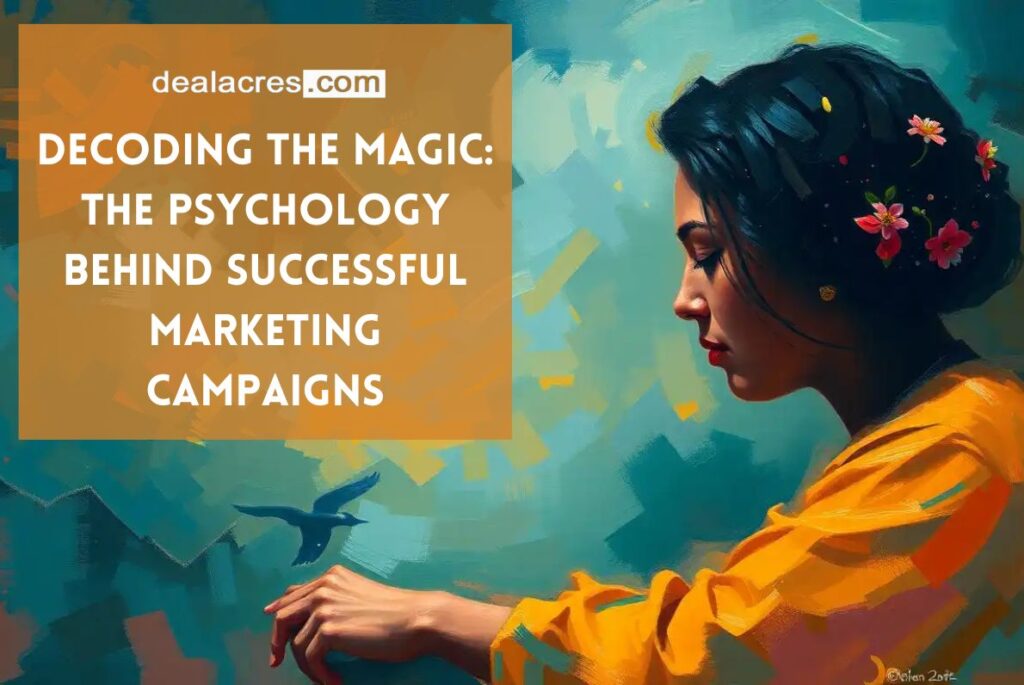Introduction:
Marketing isn’t just about selling products; it’s about connecting with people on a deeper level. Successful marketing campaigns don’t just happen by chance. They are carefully crafted to tap into the psychology of consumers, making them feel a certain way about a product or service. In this article, we’ll explore the fascinating world of the psychology behind successful marketing campaigns and understand the key principles that make them effective.

Understanding Consumer Psychology:
Emotional Connection:
Successful marketing campaigns go beyond highlighting product features; they aim to create an emotional connection with the audience. Emotions play a crucial role in decision-making, and brands that evoke positive feelings are more likely to be remembered and trusted.
Storytelling:
Humans are wired to love stories. A compelling narrative can turn a simple product into something relatable and memorable. Marketing campaigns often tell stories that resonate with the audience, creating a sense of shared experience and understanding.
The Power of Colors:
Colors evoke specific emotions and reactions. For example, red can signify passion and urgency, while blue may convey trust and reliability. Marketers carefully choose colors to align with the intended emotional response, creating a visual language that speaks to consumers.
Social Proof:
People tend to follow the crowd. Successful marketing campaigns leverage social proof by showcasing testimonials, reviews, or endorsements. When consumers see that others have had positive experiences, they are more likely to trust and engage with the brand.
Scarcity and Urgency:
The fear of missing out (FOMO) is a powerful motivator. Limited-time offers, exclusive deals, or the notion of scarcity can drive consumers to make quick decisions. Marketers use this psychological principle to create a sense of urgency and boost sales.

Influencing Decision-Making:
Cognitive Biases:
Human brains are not always rational. Cognitive biases, such as confirmation bias and anchoring, influence decision-making. Marketers leverage these biases to present information in a way that aligns with consumers’ preconceptions, making their products more appealing.
The Power of Free:
The word “free” has a magical effect on consumers. Even if it’s a small freebie or a limited-time trial, the perception of getting something for nothing triggers a positive response. Successful marketing campaigns often incorporate free elements to attract and retain customers.
Behavioral Economics:
Understanding economic behavior is crucial in marketing. Concepts like loss aversion (the fear of losing outweighs the pleasure of gaining) and prospect theory (people are more sensitive to potential losses than equivalent gains) shape marketing strategies, encouraging brands to frame their messages in a way that minimizes perceived risks.
Choice Architecture:
Too many choices can overwhelm consumers. Successful marketing campaigns simplify decision-making by presenting options in a way that guides consumers toward a specific choice. This concept, known as choice architecture, ensures that the decision-making process is smooth and less daunting.

Building Trust and Credibility:
Authenticity:
Consumers can sniff out inauthenticity from a mile away. Successful marketing campaigns are built on authenticity, with brands being transparent about their values, practices, and even shortcomings. Authenticity builds trust and fosters long-term relationships with customers.
Consistency:
Consistency in messaging and branding helps build a reliable image. When consumers encounter a brand with a consistent message across various platforms, it reinforces the brand’s identity and contributes to a sense of trustworthiness.
Building a Community:
Brands that create a sense of community around their products or services establish a loyal customer base. Successful marketing campaigns often involve engaging customers in discussions, encouraging user-generated content, and fostering a sense of belonging.
Conclusion:
In the ever-evolving landscape of marketing, understanding consumer psychology is the key to creating successful campaigns. By tapping into emotions, leveraging cognitive biases, and building trust, brands can establish lasting connections with their audience. As technology advances and consumer behaviors change, the fundamentals of psychology remain at the core of effective marketing. In essence, successful marketing isn’t just about selling products; it’s about understanding and resonating with the hearts and minds of consumers.




